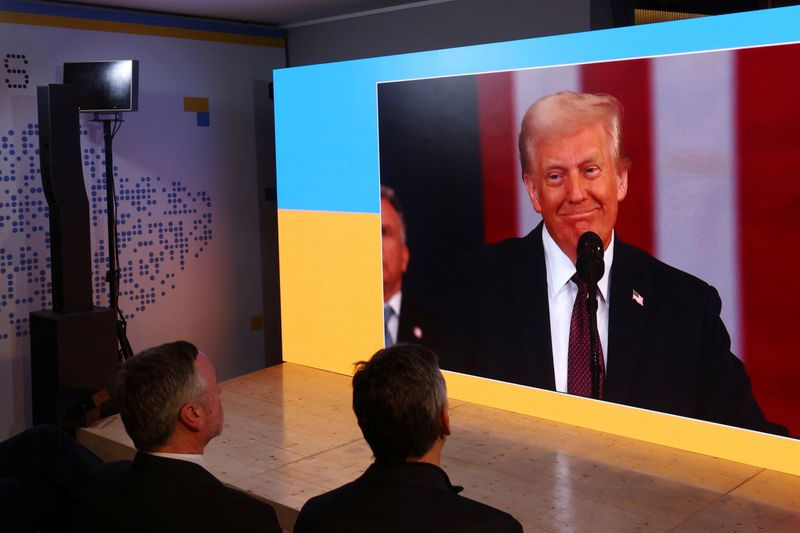(Refiling to correct envoy’s first name to Lutfey from Luftey)
DAVOS, Switzerland (Reuters) -President Donald Trump’s escalating pressure on the private sector to ditch diversity programs has left some in Davos searching for new words to describe workplace practices they say are essential to their businesses.
Trump has issued a series of executive orders cutting federal diversity, equity and inclusion (DEI) programs, which attempt to promote opportunities for women, ethnic minorities, LGBTQ+ people and other traditionally underrepresented groups.
He has also sought to dissuade private companies that receive government contracts from factoring underrepresentation into hiring decisions.
Trump’s moves on DEI have reverberated through the corridors of the World Economic Forum’s annual meeting in Davos, where gender parity, diverse workforces and better representation of minorities around the world continue to be key goals.
While tech companies Meta and Amazon, which hold U.S. government contracts, say they are scaling back some initiatives, other executives at Davos told Reuters they will remain, if by another name.
“There’s a lot of talk and a lot of maybe even controversy around the names of things,” said Miguel Stilwell d’Andrade, CEO of Portugal’s largest utility company EDP,, which has 40% of its investments focused on renewable energy in the U.S.
“The important thing is we want to have the best talent in the company, from wherever it may be, men, women, different ethnicities, and we want to make sure that people … have the best working conditions and feel comfortable,” he said.
“We’re not working for DEI tick the box,” Stilwell added.
Other policymakers and executives said the acronym DEI had become damaging, even as they doubled down on their commitment to diversity.
“It became toxic, as has ESG, and there are some wrong reasons for that and there are some right reasons for that,” Lutfey Siddiqi, Special Envoy of the Head of the Interim Government of Bangladesh, said on a panel about gender parity.
“But I’m more interested in what is effective, how do we get to the result as opposed to the label,” Siddiqi added.
DEI initiatives were introduced by many companies and governments around the world to address historical inequities in the workforce. While some gains have been made in recent years, gender parity has not been reached in any country.
Proponents warn that continued rollbacks may endanger recent advances.
TECH CONTRACTS
Reuters spoke with at least three tech executives whose companies have contracts with the U.S. government. They said they remained committed to diversity programs in the workplace.
Although the risk of losing contracts because of Trump’s executive orders would force them to look for new ways to describe DEI initiatives, they would not cut them entirely.
One European tech company executive, who spoke on condition of anonymity, told Reuters that it would not be rowing back on its commitment to inclusion and diversity.
“For many years we have worked to shape a more sustainable, equitable world. It’s rooted in our company culture,” the person said.
“The world is diverse and employee base reflects that diversity. It is one of the keys to great innovation and is good for business.”
Not all in Davos share that sentiment.
Alexandr Wang, CEO of high-profile start-up Scale AI, cheered Trump’s executive orders in a post on X and called for the promotion of MEI (merit, excellence and intelligence) in tech.
Nikki Haley, former U.S. ambassador to the United Nations, also welcomed what she said was a retreat from DEI.
“In every business, you are starting to see pulling back from DEI and I welcome that, I think it’s really important,” Haley told a panel on the sidelines of the WEF meeting.
“What we’re seeing in America, everybody just wants to be Americans. They don’t want to be a label. They don’t feel like they can take it anymore,” Haley added.
One European industrial company with a large U.S. footprint said it would continue with its diversity and inclusion programs because they were important to the business as well as society.
“We will stick to our values of tolerance and respect; inclusion is important,” a board member told Reuters, adding: “Companies need to stay the course of the agenda in terms of values and policies, and that’s what we’re doing.”
“You want diverse opinions in the room and you want every opinion to have a similar weight. You want to move away from group think, especially when the pace of change is so rapid.”
MONEY FLOWS
Investment in diversity is also unlikely to dry up because of Trump’s moves, said bankers at Davos.
“For the investors of this world, ESG criteria – of which DEI is a part – are very important and will continue to be very important,” said Bain & Company’s Alexander Schmitz, who heads up the firm’s Private Equity practice in EMEA.
“When I look at it from a higher level, the overarching, mega themes of ESG investing are still there: I haven’t seen much rolling back of that as yet. If you are a private equity fund and start rolling back DEI strategies, then – among other effects – you will likely have a problem in fundraising and that’s not where you want to be.”
Bank of America Chief Executive Brian Moynihan described diversity as having “commercial logic”.
“There’s going to be a lot of good, courageous conversations going on,” Moynihan said. “Do we have the thoughtful balance right in companies and institutions … Do we have the balance right that everybody feels included?”
(Reporting by Krystal Hu, Elisa Martinuzzi, Marwa Rashad, Lananh Nguyen, Echo Wang, Divya Chowdhury; Writing by Leela de Kretser; Editing by Alexander Smith)
